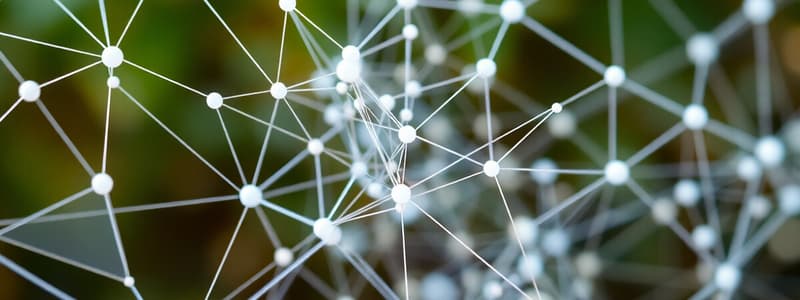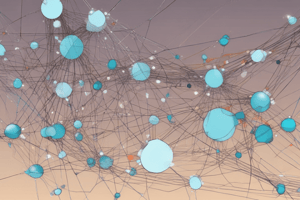Podcast
Questions and Answers
What aspect of a system's operation does sequential execution in Petri Nets primarily capture?
What aspect of a system's operation does sequential execution in Petri Nets primarily capture?
- The resources consumed by each action.
- The timing of actions within the system.
- The precedence constraints between actions. (correct)
- The synchronization of concurrent tasks.
How do Petri Nets model mutual exclusion in systems?
How do Petri Nets model mutual exclusion in systems?
- By allowing multiple transitions to fire simultaneously.
- By prioritizing transitions based on their importance.
- By ensuring transitions sharing resources cannot execute concurrently. (correct)
- By creating multiple tokens for shared resources.
In Petri Nets, what is the function of a 'fork'?
In Petri Nets, what is the function of a 'fork'?
- To multiply resources (tokens). (correct)
- To represent a decision point in the system.
- To reduce resources (tokens).
- To split the process flow into multiple branches.
What is the purpose of a 'join' in Petri Nets?
What is the purpose of a 'join' in Petri Nets?
Which programming structure can be modeled using Petri Nets?
Which programming structure can be modeled using Petri Nets?
How are Case/Switch statements modeled using Petri Nets?
How are Case/Switch statements modeled using Petri Nets?
In the context of Petri Nets, what does the reachability set R(N, m) represent?
In the context of Petri Nets, what does the reachability set R(N, m) represent?
What does it mean for a Petri Net to be 'safe'?
What does it mean for a Petri Net to be 'safe'?
Which of the following is NOT a component of the Petri Net tuple definition, $PN = (P, T, F, M_0, 𝓁)$?
Which of the following is NOT a component of the Petri Net tuple definition, $PN = (P, T, F, M_0, 𝓁)$?
Given a Petri Net and a marking M, what does M[t〉M' signify?
Given a Petri Net and a marking M, what does M[t〉M' signify?
What does a firing sequence in a Petri Net represent?
What does a firing sequence in a Petri Net represent?
In the context of Petri Nets, what information does the labeling function 𝓁 : T → 𝛴 provide?
In the context of Petri Nets, what information does the labeling function 𝓁 : T → 𝛴 provide?
What is the significance of reachable markings in the analysis of a system modeled by a Petri Net?
What is the significance of reachable markings in the analysis of a system modeled by a Petri Net?
Which of the following statements accurately describes the relationship between a Petri Net (PN) and its Reachability Graph (RG)?
Which of the following statements accurately describes the relationship between a Petri Net (PN) and its Reachability Graph (RG)?
According to the theorem provided, how can one determine if a sequence of symbols is a valid firing sequence of a Petri Net using its Reachability Graph?
According to the theorem provided, how can one determine if a sequence of symbols is a valid firing sequence of a Petri Net using its Reachability Graph?
Consider a Petri Net modeling a simple process. If the firing of a transition 't' represents an event 'a', and a firing sequence fs = 𝓁(t1) 𝓁(t2)… 𝓁(tn) = 'aba' is observed, what does this imply?
Consider a Petri Net modeling a simple process. If the firing of a transition 't' represents an event 'a', and a firing sequence fs = 𝓁(t1) 𝓁(t2)… 𝓁(tn) = 'aba' is observed, what does this imply?
Flashcards
Sequential Execution
Sequential Execution
Captures the order of actions in a system.
Synchronization
Synchronization
Represents resource synchronization for tasks within a system.
Conflict
Conflict
Models choices between available tasks or actions.
Mutual Exclusion
Mutual Exclusion
Signup and view all the flashcards
Fork
Fork
Signup and view all the flashcards
Join
Join
Signup and view all the flashcards
Reachability
Reachability
Signup and view all the flashcards
Boundedness (Safety)
Boundedness (Safety)
Signup and view all the flashcards
Petri Net (PN)
Petri Net (PN)
Signup and view all the flashcards
Places (P)
Places (P)
Signup and view all the flashcards
Transitions (T)
Transitions (T)
Signup and view all the flashcards
Flow Relation (F)
Flow Relation (F)
Signup and view all the flashcards
Initial Marking (M0)
Initial Marking (M0)
Signup and view all the flashcards
Firing Sequence
Firing Sequence
Signup and view all the flashcards
Reachable Marking
Reachable Marking
Signup and view all the flashcards
Reachability Graph (RG)
Reachability Graph (RG)
Signup and view all the flashcards
Study Notes
- SOFT40171 - Design and Development of Secure Systems, delivered in week 3 focuses on Petri Nets Features.
Agenda
- Core Petri Nets definitions are recalled.
- Petri Nets can model system features.
- Data Flow structures can be modelled
- Net properties are explained.
Learning Objectives
- Recall Petri Nets definitions.
- System features are modeled using Petri Nets.
- Petri Nets data flow structures are applied.
- Net properties in Petri Nets are understood.
Petri Nets - Formal Definition
- A Petri net is a tuple PN = (P, T, F, Mo, l).
- P is a finite set of places.
- T is a finite set of transitions.
- F⊆ (PxT)U(TxP) is the flow relation.
- An arc is drawn from x to y whenever (x,y)∈F
- Mo: P → {0, 1, 2, ...} is the initial marking
- l:T → ∑ is a labeling of transitions using some alphabet ∑ of symbols (optional).
Firing Sequence and Reachable Marking
- Notation M[t)M' means transition t is enabled at marking M, and firing it leads to marking M'.
- Starting from the initial marking Mo, a sequence of transitions t₁t₂...tₙ may fire if there are markings M₁,M₂,...,Mₙ such that Mo[t₁) M₁[t₂) M₂... Mₙ₋₁[tₙ) Mₙ
- fₛ = l(t₁) l(t₂)... l(tₙ) is a firing sequence
- Mₙ is a reachable marking
- Firing sequences represent what an observer of the system would see (i.e., system functioning).
- Reachable markings are the (global) states the system can find itself in.
Reachability Graph
- A Reachability Graph (RG) is defined as a labeled directed graph RG(PN) = (V, Arcs, vo).
- V is the set of nodes i.e., all reachable markings.
- Arcs is the set of labeled arcs
- There is an arc labeled a from M to M' if for some transition t, M[t)M' and l(t)=a.
- vo is the initial node: initial marking Mo
- A reachability Graph represents all the reachable markings and firing sequences of a PN.
- A firing sequence fₛ , of PN exists iff there is a directed path from the initial node (i.e., vo) of RG(PN) such that fₛ is the sequence of arc labels encountered along this path.
Petri Nets - Modelling System Features
- Petri Nets provide a way to capture the precedence constraints related to actions during a system's operation using Sequential Execution.
- Petri Nets enables the representation of resources synchronisation for the tasks or actions involved in a system's behaviour, therefore can be used for Synchronisation.
- Petri Nets can model choices among available system's tasks or user's actions withConflict modelling.
- Petri Nets can successfully model the sharing of resources used within a system, with Mutual Exclusion modelling.
- Performing actions (executing transitions) that share resources results in disabling the execution (firing) of one (or more) of the available actions (transitions).
- Fork in Petri Nets multiples the resources (tokens) to represent resources required for system's operation.
- Join in Petri Nets reduces the resources (tokens) to represent resources joint together for making another resource required for system's operation.
Petri Nets - Modelling Data Flow Structures
- Conditional data flow structures (i.e., If – Else) can be constructed using Petri Nets.
- Case/Switch statements can be modeled using Petri Nets.
- While loops can be represented using Petri Nets.
- For loops can be modeled via Petri Nets.
Petri Nets - Net Properties
- Reachability helps determine the set of all markings m' reachable from initial marking mo, notated as R(N,m) for a net N.
- A net N with initial marking mo is considered safe if all places always hold at most 1 token.
- A marked net is k-bounded if places hold no more than k tokens.
- A marked net is conservative if the number of tokens is constant.
- A Petri net (N,Mo) is said to be live (or equivalently Mo is said to be a live marking of N) if, no matter what marking has been reached from Mo, it is possible to ultimately fire any transition of the net by progressing through some further firing sequence.
- A deadlock in a transition appears when that transition can never fire or be executed.
- A live Petri net guarantees deadlock-free operation, no matter what firing sequence is chosen.
Summary
- Petri Nets can capture different system features effectively.
- Petri Nets can represent logical and programming structures.
- Net properties are well-defined in Petri Nets, providing useful information about a system's behaviour.
Studying That Suits You
Use AI to generate personalized quizzes and flashcards to suit your learning preferences.
Related Documents
Description
This lesson covers Petri Nets, recalling core definitions and explaining how they can model system features. Data flow structures are modeled. It also explains properties of Petri Nets.


